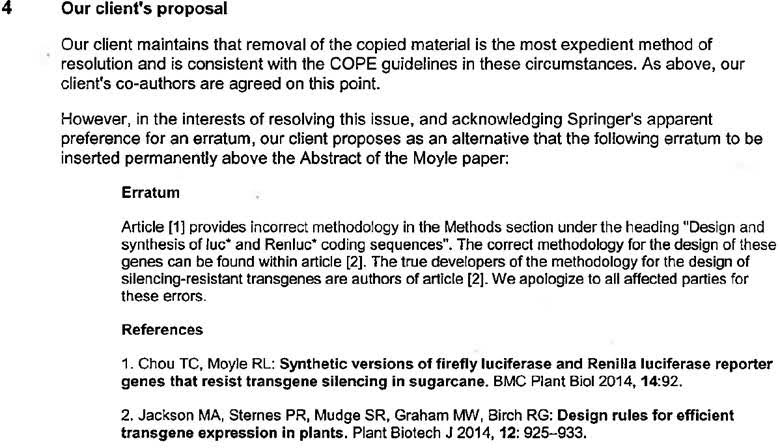 When a researcher suspected a paper on fireflies had borrowed some of its methodology, he called lawyers to help him convince the publisher to craft a correction notice that was to his satisfaction.
When a researcher suspected a paper on fireflies had borrowed some of its methodology, he called lawyers to help him convince the publisher to craft a correction notice that was to his satisfaction.
Although the authors submitted a correction to BMC Plant Biology acknowledging Robert Birch as the original author of some material, as we reported previously, the publisher instead issued an expression of concern (EOC), noting that there was an “authorship dispute.”
When our post ran earlier this year, we didn’t know why a request for correction had turned into an EOC, which — as its name states — is typically more cause for concern than a correction. We’re still not sure exactly why, but we have learned that Birch disputed the content of the authors’ suggested correction, and hired lawyers to try to change the wording. From his perspective, there are several problems with the paper, he told us:
In brief: (1) There are serious errors in the methodology and claims made in the text of the article (not merely in Supplementary Table 1). (2) As repeatedly advised, I am not the sole author of the inappropriately copied material or the sole developer of the associated technology. The true original authors and developers of this technology are authors of doi: 10.1111/pbi.12197, which was submitted before doi:10.1186/1471-2229-14-92. (3) Most disturbingly, doi:10.1186/1471-2229-14-92 continues to be published with serious scientific errors, without any warning to readers in the pdf article being promulgated by Springer/BMC.
Here’s the text of the correction that author Richard Moyle submitted for “Synthetic versions of firefly luciferase and Renilla luciferase reporter genes that resist transgene silencing in sugarcane,” which Birch did not agree with:
There are two omissions in supplementary table 1. The corrected table can be found within “Design rules for efficient transgene expression in plants”, Plant Biotechnology Journal (2014) 12 pp. 925-933.
The authors would also like to acknowledge Robert Birch as the original author of the supplementary table and technical information provided in the material and methods section under the heading “Design and synthesis of luc* and Renluc* coding sequences”.
The EOC that ended up running expressed pretty much the same content (as you can see in our original post), and noted additionally that:
The University of Queensland advises that there has been no academic misconduct but the wording of any erratum remains under dispute.
We confirmed that an investigation at the University of Queensland, where the authors and Birch worked together until Birch retired in 2014, found no evidence of misconduct.
According to Birch, after UQ and Springer declined to remove his material from the paper, he hired lawyers to help him issue a satisfactory correction. Here’s what Birch request, via a snippet of a communication that his legal counsel sent to the publisher, BioMed Central (BMC), which Birch gave us permission to print:
When the publisher declined that proposal, Birch dropped the lawyers, he told us:
It was important to have qualified legal advice to Springer/BMC that they are in breach of the moral rights provisions of copyright law, but I can not afford and thus do not intend to take any further legal action.
We ran Birch’s claims by Moyle, who said:
Following a complaint from Prof Birch, the University of Queensland conducted a comprehensive investigation.
The University determined that Prof Birch’s claims could not be substantiated but that an Erratum should be submitted. The erratum was agreed between myself and BMC Plant Biology, and was endorsed by UQ. My understanding is that Prof Birch disputed the wording of the Erratum submitted to BMC Plant Biology and refused to endorse it.
It is also my understanding that all concerns raised by Prof Birch to UQ have been addressed.
A spokesperson for UQ told us that Moyle’s statement is accurate.
We also asked if Birch’s specific complaints quoted in this post were addressed in the UQ investigation. Anton Middelberg, the UQ Pro Vice Chancellor told us:
The University of Queensland has conducted an extensive investigation into Dr Birch’s initial complaints of a breach of his intellectual property rights and then his subsequent claims of plagiarism and infringement of his moral rights, regarding supplementary Table S1 and sections of wording published in Moyle and Chou’s paper “Synthetic versions of firefly luciferase and Renilla luciferase reporter genes that resist transgene silencing in sugarcane”.
In both cases, the University determined, after thorough investigation and interviews of all parties, that Dr Birch’s claims could not be substantiated. An Erratum agreed between Dr Moyle and BMC Plant Biology, and endorsed by UQ, addressing errors made in reproducing the table of motifs and appropriately attributing one of its creators, Dr Birch, was submitted. Dr Birch disputed the wording of the Erratum submitted to BCM Biology and refused to endorse it.
It remains our view that disagreements regarding methodology and interpretation should be addressed in the usual way through scientific discourse in the peer reviewed literature. If Dr Birch has further concerns regarding the scientific content of the article, he should raise these directly with BMC Plant Biology, or with The University of Queensland.
A spokesperson for BMC declined to comment on this case.
Like Retraction Watch? Consider making a tax-deductible contribution to support our growth. You can also follow us on Twitter, like us on Facebook, add us to your RSS reader, sign up on our homepage for an email every time there’s a new post, or subscribe to our new daily digest. Click here to review our Comments Policy.
